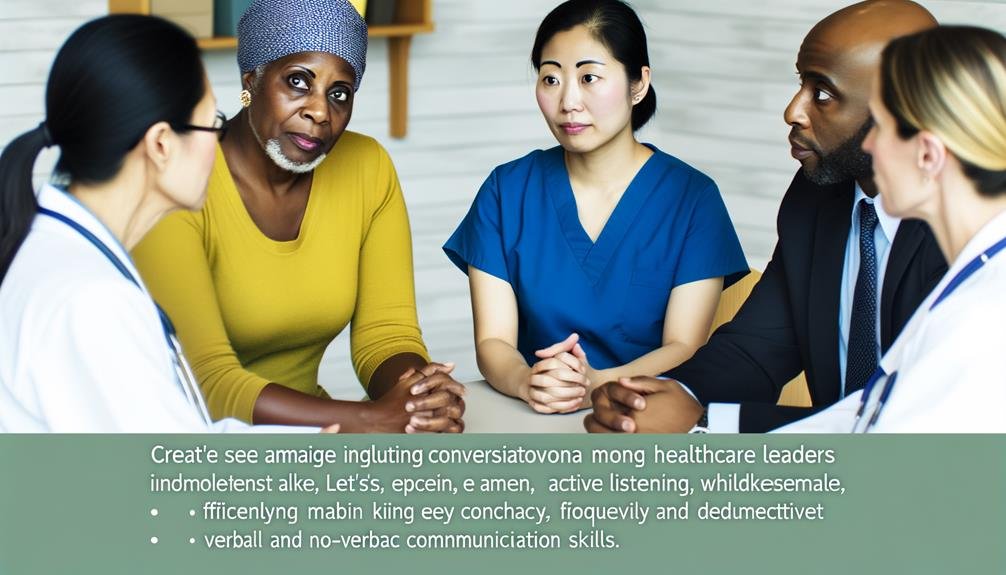Healthcare Leaders' Communication Skills: Vital Strategies Revealed
Effective communication lies at the heart of successful healthcare leadership, driving positive patient outcomes and cohesive teamwork. As healthcare landscapes evolve, the ability of leaders to convey information clearly and with empathy becomes increasingly crucial.
By uncovering key strategies and insights to enhance communication effectiveness, healthcare leaders can navigate complex scenarios with finesse. From bridging cultural divides to leveraging innovative technologies, the realm of communication in healthcare leadership is multifaceted and dynamic.
Join us on this exploration of vital strategies that underpin effective healthcare leadership communication.
Key Takeaways
- Active listening and empathy are essential for healthcare leaders to understand and connect with their teams and patients.
- Utilizing plain language and non-verbal cues enhances communication clarity in healthcare leadership roles.
- Implementing feedback mechanisms and training programs help healthcare leaders continuously improve their communication skills.
- Overcoming communication challenges through cultural competency and conflict management is crucial for effective healthcare leadership.
Importance of Communication Skills in Healthcare Leadership
Effective communication skills are paramount in healthcare leadership as they serve as the foundation for fostering positive patient outcomes and cohesive team dynamics. Effective leadership hinges on communication effectiveness, enabling leaders to convey vision, goals, and expectations clearly.
In healthcare, the ability to communicate effectively can reduce medical errors, improve patient satisfaction, and build trust among team members. Clear communication ensures that complex medical information is understood by patients and facilitates collaborative decision-making.
Strategies for Enhancing Communication Skills
In the realm of healthcare leadership, honing communication skills through strategic approaches is pivotal for fostering positive patient outcomes and cohesive team dynamics. To enhance communication skills effectively, consider the following strategies:
- Role-playing exercises: Engage in scenarios to practice various communication styles and responses.
- Simulation training: Simulate real-life healthcare situations to improve communication under pressure.
- Feedback mechanisms: Regularly seek input to refine communication strategies and address areas for improvement.
- Interprofessional collaboration: Work with different healthcare professionals to understand diverse communication styles and enhance teamwork.
Technology's Role in Communication Improvement
Technology plays a crucial role in enhancing communication within the healthcare sector by facilitating efficient information exchange and remote interactions.
Virtual reality training has emerged as a valuable tool for healthcare professionals to practice and improve their communication skills in realistic scenarios.
Telemedicine applications enable remote consultations, enhancing accessibility to healthcare services and facilitating communication with patients who are unable to visit in person.
Electronic health records streamline information sharing among healthcare providers, ensuring seamless communication and coordinated care.
Health apps empower patients to communicate their health data to healthcare providers conveniently.
Additionally, communication platforms offer secure messaging capabilities for healthcare teams to collaborate effectively.
These technological advancements play a significant role in enhancing communication and ultimately improving patient care outcomes.
Overcoming Communication Challenges in Healthcare
Navigating the diverse landscape of healthcare settings requires a comprehensive approach to overcome communication challenges effectively. To address these obstacles successfully, healthcare leaders can implement the following strategies:
- Addressing Language Barriers: Utilize interpreter services to ensure clear communication with patients who speak different languages.
- Cultural Competency Training: Provide education and training to healthcare staff to navigate diverse cultural backgrounds and practices effectively.
- Conflict Management: Handle conflicts constructively to maintain open and effective communication channels.
- Training for High-Stress Situations: Enhance communication skills through specialized training to improve interactions during high-pressure scenarios.
Impact of Effective Communication on Patient Care
Enhancing patient care outcomes significantly hinges on the effective communication skills demonstrated by healthcare providers. Clear and empathetic communication plays a pivotal role in improving patient engagement and treatment adherence. When healthcare professionals effectively convey information to patients, it leads to higher satisfaction levels, reduces anxiety, and enhances patient understanding of their care plans. This, in turn, results in better adherence to treatment protocols and overall improved healthcare outcomes. The table below highlights the key impacts of effective communication on patient care:
| Impact of Effective Communication on Patient Care |
|---|
| Higher patient satisfaction |
| Reduced patient anxiety and confusion |
| Enhanced patient engagement in care plans |
| Improved treatment adherence |
| Better overall healthcare outcomes |
Training and Development for Communication Skills
Effective communication in healthcare is paramount, and to further develop and hone these essential skills, healthcare providers engage in comprehensive training and development programs. These programs encompass various strategies to enhance communication skills, such as:
- Role-playing exercises: These exercises allow healthcare providers to practice different communication scenarios and improve their responses.
- Simulation training: Healthcare professionals engage in simulated medical situations to practice communication in a realistic setting.
- Continuing education programs: These programs focus on enhancing communication skills specific to healthcare settings.
- Interprofessional training: Collaborative training sessions promote effective communication among diverse healthcare teams, fostering better patient care outcomes.
Summary of Key Communication Strategies
Clear and empathetic communication lies at the core of effective healthcare leadership, ensuring positive patient outcomes and cohesive team dynamics. In healthcare settings, employing role-playing scenarios can help leaders and staff practice various communication approaches, preparing them for real-life situations. Patient engagement is another crucial aspect that leaders should focus on, involving patients in decision-making processes and treatment plans to enhance their understanding and commitment to care. By prioritizing these strategies, healthcare leaders can foster trust, improve patient satisfaction, and create a supportive environment for both patients and staff.
| Key Communication Strategies | |
|---|---|
| Role-playing scenarios | |
| Patient engagement | |
| Clear and empathetic communication | |
| Team collaboration |
Conclusion
In conclusion, the mastery of communication skills in healthcare leadership is not just important, but absolutely crucial for ensuring optimal patient care and team collaboration.
By honing strategies such as active listening, utilizing plain language, leveraging technology, and overcoming communication challenges, healthcare leaders can elevate the standard of care delivery and organizational effectiveness within the healthcare domain.
Through targeted training and development initiatives, the impact of effective communication on patient care outcomes can be truly transformative.






